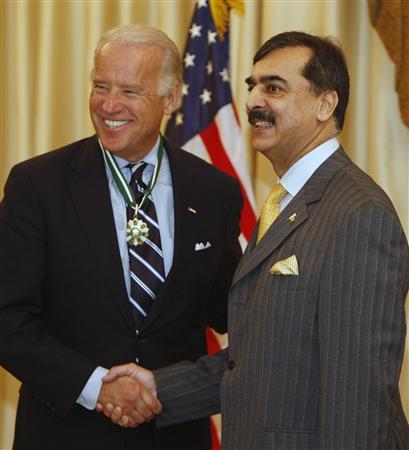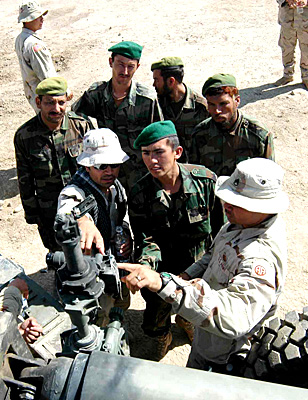
American proposals to root out terrorists in Afghanistan and Pakistan (AfPak) have largely been shielded from criticism as everyone from policy makers to pundits has regarded it as a war of necessity. Unlike the pinnacle of the Iraq war, where polls opined that mobilizing resources was a never-ending drain on American forces, the need to contain the swelling insurgency in Afghanistan and oust militants in the porous regions of Pakistan's northern border has largely been viewed as critical for both Western and global well being. From the days of the campaign trail to President Barack Obama's March press conference detailing his AfPak strategy, proposed tactics in the region have certainly been scrutinized, but truly vocal criticisms -- questioning whether the area should even be engaged to begin with -- have maintained low decibel levels...until now.
Last week, when the Administration marched up the steps of Congress requesting $83.4 billion in supplemental funding for ongoing operations in 2009, legislators started to tense up. From Members of the Progressive Caucus such as Congresswoman Lynn Woolsey (D-CA) to Rep. John Conyers (D-MI), to more conservative Democrats such as John Murtha (D-PA), a symphony of skepticism started to resonate in the halls of Capitol Hill. With overtures demanding to know just how far down the proverbial rabbit hole this endeavor will take us and what an exit strategy may look like, President Obama faces the unique political battle of having to re-convince the American people that the operations maintains a clear set of measurable objectives, just as the heart of the mission is about to get underway.
Unfortunately, the constituencies that still require convincing aren't exclusively stateside. Increasingly, more audible criticisms of Western operations have emanated from the AfPak region itself. At a recent presentation hosted by the Atlantic Council, the Pakistani Ambassador to Washington, Hussain Haqqani, voiced concern that the Obama administration appeared to be dictating conditions from a top-down approach instead of collaborating with the government of Pakistan as a coalition partner. The propensity for America to meddle in others' affairs leads to the mentality, "that the world is a problem for America to fix...Please, do not try to fix us," Haqqani said. Even in Afghanistan support is starting to tumble. A February 2009 ABC News/BBC/ARD poll indicates that only a little more than a third (37%) of Afghans in their area supports Western forces; that support was at 67% in 2006. The poll also notes that "25% now say attacks on US or NATO/ISAF forces can be justified, double the level, 13%, in 2006."
There is no reason to believe that opposition in the US House of Representatives to extend funding will carry enough votes to reject the appropriations request. Nor is there a belief that the waning sense of Western approval in the AfPak region will take the form of requests for America to retreat altogether. But, as a Senator who consistently rejected Iraq War spending bills, the President understands that brewing opposition can corrode public support for military engagements (both at home and abroad). Consequently, financing, resources and resilience for operations expected to last at least through his first term could be shortchanged if Afghans, Pakistanis and Congressional representatives see anything less than a winnable task at hand. At the risk of the kicking things off in the region with a trust deficit among the very people Barack Obama seeks to protect, the Administration must embark on a renewed campaign: (a) to persuade the people and institutions in Afghanistan and Pakistan that our presence is necessary and (b) to persuade the United States people and lawmakers that our efforts will be sufficient.

Neither of these conditions can be addressed with one-size fits all band-aid solution. But in recent years US foreign policy seems to tout a doctrine of sorts that more troops will always be solvent in turning quagmires around. There is no doubt that the American military -- encompassing some of the world's bravest and finest men and women -- is a formidable force in stalling insurgencies and stabilizing regimes. However, concerns stirring opposition overseas are not ones that can be redressed just by placing more boots on the ground.
Beyond just Taliban security concerns, corruption is so rife in Afghanistan that people are losing faith in governing bodies and officials at all levels. As Richard Oppel of the New York Times reports, "... better policing may be impossible for Afghanistan unless government officials at all levels stop cannibalizing their civil administration and police force for a quick profit." Even those wishing to seek a more honest route end up participating in the Taliban's corrupt ways since abstaining can result in punishment or the threatening of loved-ones. First Lieutenant Craig Porte, an intel officer in the Ghazni province, notes that, "You could say that the corruption...is an investment in your future, and your family's future. It is fairly common to buy your position...[and] if you are not involved...you are seen as an enemy of those who are, which has a tendency to get you fired." And in neighboring Pakistan there is an increasing mentality that this war belongs to the US, not to them. Jane Perelez, reporting from Islamabad, grounds that concern in the fact that, "...many Pakistanis have concluded that reaching an accommodation with the militants is preferable to fighting them. Some, including mid-ranking soldiers, choose to see the militants not as the enemy, but as fellow Muslims who are deserving of greater sympathy than are the American aims." The mindset (that this fight is out of Pakistanis' hands) is also furthered as every penny of aid proposed for Pakistan is attached to a variety of strings and conditions, terms that Prime Minister Yousaf Raza Gilani expressed would generate ill-will among his people. The US government has held legitimate concerns with how aid money in the past has been handled in the region, and even tied the Pakistan's intelligence services (the ISI) to militants. But as the former director general of the ISI, Lieutenant General Ashraf has said, "You can't start a successful operation with a trust deficit...The serving army people will say, 'To hell with them if this is what we are going to get after laying down more than 1,500 lives.'" Matters of corruption and distrust among militaries and Muslims unwilling to fight other Muslims are certainly epic in scope, with no easy solutions. But they are telling of a reality demands more than just military might.
Some legislators in the United States also remain haunted by recent memories of Iraq where troops were piled into areas with seemingly no end in sight. Let alone they feared putting young Americans in harm's way, the issue was also politically thorny as authorizing money and extending the war could cost them votes back in their districts. Similarly, that is where much of the anxiety about the AfPak supplemental appropriations request originates.
Simply put, increasing doubt among the very people we are trying to liberate could feed the doubt that Congress (aka the bank) has about a clear way to win at this effort. But President Obama must allay these fears by re-selling the war in a way that moves away from messages that just discuss war solutions in terms of troops. Now he must make the pitch for operations with messages focused on: rooting out corruption, turning the tide on distrust and assuring Afghans and Pakistanis that Americans won't be setting the terms from the top-down, but as collaborative brothers in arms.

Surely this is ambitious. But attempting to remake the national psyche is critical for what the United States is about to undertake. First, the Administration should make it painstakingly clear that we are not calling the shots in this operation exclusively on our own terms. On the campaign trail, then-Senator Obama passionately plead that we must restore the world's faith in the US by building coalitions and partnerships. Yet, with Pakistani soldiers starting to doubt whether "America's war" is even worth the fight, it is clear that no matter how hard the President may be trying, we have not sufficiently undone the Bush-era aura of unilateralism. Therefore, the US should consult with the AfPak governments & NATO allies, and include them in their policy reviews. President Obama should engage individual concerns raised by Afghan or Pakistani leaders -- even if not compromised on -- in order to assure them that this is a joint effort, not a singular one.
Second, a small discretionary spending fund should be allocated within the total budget to allow both governments a slight degree of autonomy in how they spend their aid. This is not to say that conditions on aid should be forgone altogether. Yet a baby step of setting slightly broader parameters with less dictatorial oversight with money can help ease Pakistan's pride, demonstrating that we are willing to trust one another.
Third, Obama should speak to improving civilian institutions in both countries by placing more of an emphasis on economic development outside military-controlled areas of the economy. These efforts could yield a civilian-military pact that could outline each country's interest on a regional level, bolstering a blue print for long term stability. This will move the ball on dialogues regarding outstanding territorial issues involving India. But it could also start to address Al-Qaeda's exploitation of the largest ethnic group, the Pashtuns. As the Asia Society points out in a recent report, "Al-Qaida has exploited [their] lands to establish a safe haven among people who do not support its ideology but whose poverty, isolation, and weak governance leave them vulnerable." If the West can, "open the Durand Line as an official open border, guarantee Afghanistan's access to the port of Karachi, and assure free land transit of products," it would enable an economic livelihood alternative to corruption and extremism.
Lastly, Administration shouldn't just allocate money and supplies whenever it decides to, but actually lend a hand when genuine appeals by AfPak leaders are made. Pakistani military officials have been asking for more helicopter gunships, night-vision goggles and other tools to fight in tough terrain for years, but claim Americans have slighted their requests. Even Afghan Defense Minister General Abdul Rahim Wardak told the Council on Foreign Relations that requests for more equipment (from US and NATO) have largely been ignored. "At the moment we are still lighter than light infantry...I was much [better] equipped when we were fighting the Soviets," in the 1980s, Wardak said. Thus, Obama should revise the currently proposed $11.6 billion proposed in the supplemental bill for equipment in order to respond to the needs of the AfPak government, as currently that amount has only been appropriated to "refurbish or replace" worn out equipment. By doing this Obama can better posture America as attentive to the requests and desires of the AfPak people, while also calming the nerves of Congress who saw the failures in Iraq in large part due to a lack of adequate supplies and armor.
If undertaken, these steps can help curry favor among leaders, and as the efforts become more collaborative, they will slowly but surely engender a mindset in the AfPak that the war effort is very much a part of their survival too. That will help beat back brewing opposition; it will also allow Congress to realize that the strategy in this region is one that actively engages the root causes that have led to the current distress in this area. This will help alleviate fears from Iraq that haunt legislators who felt that blindly deploying troops, swept insurgents under the rug, but did nothing to change the mentality of the country altogether. These steps are difficult and ambitious, but as President Obama increasingly has to make his pitch to two constituencies, he must realize that the case for war begins by building partnerships.
Thanks to Thomas Brugato for contributing insights to this article.
